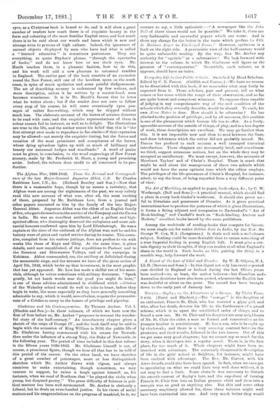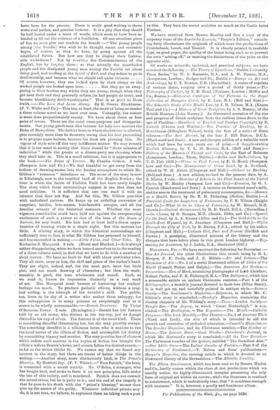NOVFLS.—Soppy ; or, the Adventures of a Savage. By Violet
Fane. 3 vols. (Hurst and Blackett.)—The "savage " is the daughter of an enthusiast, Francis St. Clair, who has married a gipsy girl, and who, after her death, devotes his life to the furtherance of a grand scheme, which is to upset the established order of things, and to found a new one. Mr. St. Clair and his daughter are near neighbours of Mr. St. Clair the elder, a man as formal and conservative as his younger brother is revolutionary. He has a son, who is brought up by clockwork ; and there is a very amusing contrast between the processes, and their results, followed in the two homes. Out of this we get some very good chapters ; but we cannot say so much for the story, when it developes into a regular novel. There is, in the first place, far too much of it. While chapters might have been re- trenched with advantage. The extremely disagreeable description of life in the girls' school at Brighton, for instance, might have been omitted with advantage. The Rev. Mr. Carver, with his Aztec dwarfs, could also have been spared. In fact, when we once get to speculating on what we could have very well done without, it is not easy to find a limit. Some obstacle was necessary to disturb the smooth current of Sophy's love, and the expedient of turning Francis St. Clair first into an Italian peasant child and then into a marquis was as good as anything else. But this and some other necessary machinery allowed for, these three volumes might well have been contracted into one. And very much better they would
• have been for the process. There is really good writing in them, some real pathos, and genuine humour. It is a pity that they should be half buried under a mass of words, which seem to have been in- tended to fill out the columns of a feailleton. Of one excellent piece of fun we must give our readers the benefit :—" The young people among [the Yezidis] who wish to be thought smart and eccentric begin, of course, as they do here, by going against all the established forms. But how are they to display their fashion- able wickedness ? Not by breaking the Commandments of the English, but by keeping them ; so that actually the unorthodox people and the dissipated young men among the Yezidis set about doing good, and scoffing at the Spirit of Evil, and they refuse to go to devil-worship, and become what we should call quite virtuous Of course, however, they are looked upon by their clergy as the wicked people are looked upon here Bat they go on swag- gering in their lawless way whilst they are young, though when they get near their end they generally reform (as bad people do here), and become bloodthirsty devil-worshippers." That is as good as Dean Swift.—The Love that Bores Alway. By E. Owens Blackburne. (F. V. White and Co.)—This has, at least, the merit of being as slender a three volume novel as we have ever seen. Unhappily, the matter is more than proportionately scanty. We have about three or four pairs of lovers. There are the usual cross-purposes and disappoint- ments. One young gentleman dies because his lady-love marries the Duke of Dampsbire. The luckier hero, to whom the heroine is allotted, gets certainly more than he deserves, seeing that his first proceeding is to propose to.an heiress, because his duns are pressing him. No vigour of style sets off this very indifferent matter. We may remark that it is not usual in society that there should be " three minutes of indecision " while the guests at a dinner-party are choosing whom they shall take in. This is a small criticism, but it is appropriate to the book.—The Braes of Yarrow. By Charles Gibbon. 3 vols. (Sampson Low and Co.)—We feel thankful to get away from the tedium of drawing-rooms into the fresher atmosphere to which Mr. Gibbon's "romance " introduces us. The scene of the story is now at Edinburgh, now iu the troubled land of the English Border ; the time is when the battle of Flodden Field has been newly fought. The story which these surroundings suggest is one that does not need criticism. It is sufficient that one can read it with an interest that does not flag. And for this, Mr. Gibbon provides with undoubted success. He keeps up an unfailing succession of surprises, battles, love-scenes, hair-breadth escapes, and all the familiar scenery of the historical romance. Whether the most vigorous constitution could have held out against the overpowering excitement of such a career as that of the hero of the Braes of Yarrow, we may doubt. His hair had at least half-a-dozen oppor- tunities of turning white in a single night. But this matters but little. A stirring story, in which the historical surroundings are sufficiently true to fact, is what Mr. Gibbon has proposed to himself, and has succeeded in writing.—Little Fifine, and Other Tales. By Katharine S. Macquoicl. 3 vols. (Hurst and Blackett.)—It is always rather disappointing, when we have braced ourselves up to the reading of a three-volume novel, to find that we have to do with a number of short stories. We have no fault to find with these particular tales. They all show, more or less, the skill and grace of the author's hand. They are slight, indeed, and, for the most part, have but little plot, and not much drawing of character ; but then the work- manship is good, the tone wholesome and sound. Each, as we read it, leaves its impression distinctly as a real work of art. Mrs. Macquoid must beware of harrowing her readers' feelings too much. To produce pathetic effects, without a trag- ical ending, is the triumph of the novelist's skill. The public, too, learn to be shy of a writer who makes them unhappy, for this unhappiness is in many persons as surprisingly real as it seems to be wholly unreasonable.—Bonnie Dunraven. By Victor O'Donovan Power. 2 vols. (Remington.)—Bonnie has her fortune told by an old crone, who divines in her tea-cup, just Es Joseph divined in his cup of silver. The fortune is of the usual kind. There is something dreadful threatening her, but she may possibly escape. The something dreadful is a villainous lover, who is anxious to run the usual career of the villain of fiction, and accomplish his destiny by committing bigamy and murder. The very peculiar law of chances which orders such matters in the region of fiction has brought the villain's wife to Bonnie's home, and events follow the desired course,— so far as the writer thinks St. We cannot say that we found any interest in the story, but there are traces of better things in the writing.—Another story, more distinctively Irish, is The Priest's Blessing. By Harriett Jay. (F. V. White).—" Poor Patrick," the hero, is connected with a secret society. Mr. O'Brien, a stranger, who has bought land, and seeks to farm it on new principles, falls under the ban of this society, and is murdered. Patrick does not commit the actual crime, but he is privy to it ; and the end of the tragedy is that he goes to his death with the " priest's blessing," sooner than give up the names of the guilty. Whatever individual priests may do, it is not true, we believe, to represent them as taking such a part
as this. They hate the secret societies as much as the Castle hate§ Fenian&











































 Previous page
Previous page